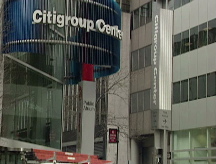Forcing banks to lend is a bad idea
President Obama is calling for 'a new era of responsibility' -- which is precisely why the government should not encourage banks to start recklessly lending.
NEW YORK (CNNMoney.com) -- If you want taxpayer money, you better lend it out.
The chorus for such a requirement on U.S. banks is growing louder by the day as the Obama administration gets set to start spending the second half of TARP money.
The government has already doled out nearly $200 billion from the Troubled Asset Relief Program, but critics say banks are being selfish, using the money to shore up their balance sheets and for acquisitions.
Better for the economy, the thinking goes, to kick it back out in the form of more credit to consumers and businesses. But is forcing banks to lend really the answer?
No. In fact, it would be counter to what President Obama eloquently called for in his inaugural address -- "a new era of responsibility."
Obama pointedly described the economy as "badly weakened, a consequence of greed and irresponsibility on the part of some." He hit the nail right on the head there.
Wouldn't forcing banks to lend possibly lead to a return of "greed and irresponsibility?"
If anything, haven't we all learned by now that loading up on loans that we could not afford to pay was the root cause of this recession. Easy credit got us stuck in this abyss; more easy credit is not going to help us claw out of it.
To be sure, banks need to continue to lend to deserving individuals and businesses. The notion of credit has been demonized lately to the point that D-E-B-T is now perhaps the dirtiest of all four-letter words. That's unfortunate since the responsible use of credit does help to keep the economy going.
Still, any new lending has to be done within reason. Banks should not be put in a position where they are making bad loans just to prove to the government that they are not hoarding cash.
"We're dealing with continuing losses from the bubble-era debt and that's going to continue to accelerate," said Daniel Alpert, managing director of Westwood Capital, a New York based investment bank.
With that in mind, the worst thing for any big bank probably to do right now is add a sizable portion of new loans to its books in the teeth of this severe recession. It's bad enough that existing loans are starting to sour.
"If I'm Citigroup or Bank of America and I just lost all this money from bad loans, the last thing I want to do is lend more money. I'll go out and get in even worse shape," said Dan North, chief U.S. economist with Euler Hermes, a leading credit insurer.
So what should banks do with their TARP largesse?
Even though it's not going to win them any fans from politicians or consumer advocates, it behooves banks to use any fresh rounds of capital to clean up their balance sheets and boost their reserves for what's likely to be a painful round of loan losses in the coming months.
The only way for banks to get into a position to be able to lend in a normal fashion is to get healthy and strong first. Banks need to learn how to slowly walk on a treadmill again without losing their breath before taking on the task of running a marathon.
"The number one thing for banks to do is to focus on their balance sheets. It is a tremendous problem," said Martin Sumichrast, a Charlotte-based venture capitalist and author who writes about real estate and finance for the blog SumichrastReport.com.
"Making dollars available for loans is priority number 2 and it's got to be done properly. You could make situation worse by giving out a bunch of risky loans at this time," he added.
Simply put, the cure for this recession lies with exactly what Obama called for: responsibility. Sure, it will make everyone feel better in the short-term if fiscal stimulus leads to looser credit and that causes people to spend more again.
But that could just set the stage for a repeat of this downturn down the road.
"We had this insanity where banks let people buy homes with no money down, and now we may get into a situation where banks are supposed to just lend for the sake of lending money. That's just not right," said Sumichrast, who is the son of the late Michael Sumichrast, the long-time chief economist for the National Association of Home Builders.
Alpert added that an end to this recession cannot -- and should not -- be achieved through increased consumption. We all, individuals and corporations, have to learn how to live within our means so that a recession of this magnitude can be avoided in the future.
"The notion of so-called stimulus needs to be rethunk. I don't think massive consumer spending is the way out. The country needs a pickup in savings and investments in the future," he said.
Saving money instead of spending money you won't be able to pay back. That sounds like responsibility to me. ![]()




